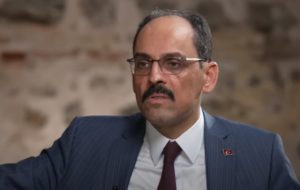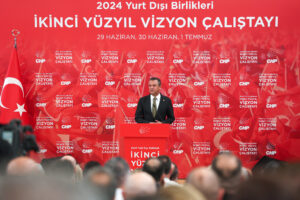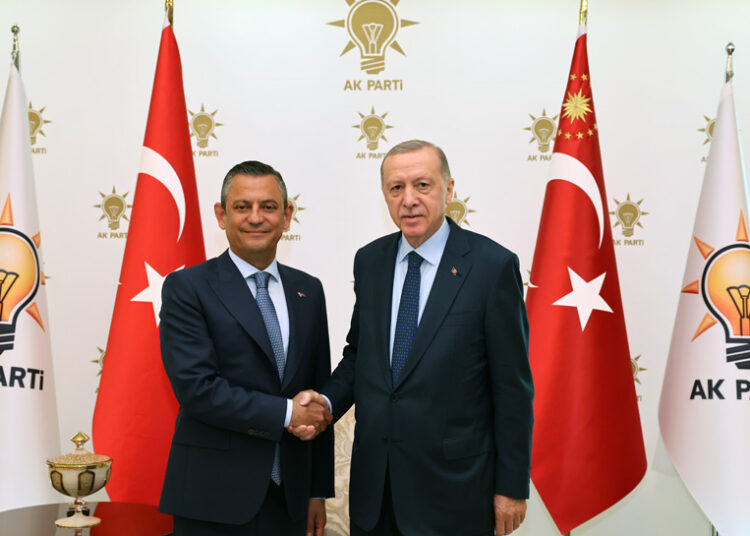Abdullah Bozkurt/Stockholm
In a controversial move, the leader of Turkey’s main opposition Republican People’s Party (Cumhuriyet Halk Partisi, CHP) has authorized unfettered access to the country’s infamous intelligence agency, Milli İstihbarat Teşkilatı (MIT), empowering the agency to vet party members — particularly those in foreign offices — thereby increasing MIT’s ability to hide its operations abroad.
This decision to forge a working relationship between the spy agency and the CHP was formalized during a clandestine meeting at CHP headquarters in Ankara on November 20, 2024. The nearly three-hour session saw MIT chief İbrahim Kalın and his deputies meet with CHP Chairman Özgür Özel, Secretary-General Selin Sayek Böke and several top aides. Notably, senior party figures, including deputy chairpersons and executive committee members, were excluded from the meeting.
The entire 12th-floor wing of the CHP building, where the meeting took place, was sealed off. Elevators were disabled and security cameras intentionally deactivated, ensuring the secrecy of the discussions. The nature of the meeting remained undisclosed until after the fact, with Özel later defending the gathering as a routine courtesy visit designed to brief CHP leadership on national security threats, particularly terrorism.
The public confirmation of how MIT would collaborate with the main opposition party came from Özel, who defended the meeting amid criticism. “We receive numerous applications at CHP offices abroad. We sought intelligence support from MIT during the recruitment process. … They responded that they would be happy to assist,” Özel said regarding the meeting.

The party leader further clarified that the CHP cooperates with the Turkish spy agency, particularly in foreign countries, citing the United States and Germany as examples. “We requested intelligence support — yes, that is correct. Especially considering that we are now planning to establish CHP representative offices in multiple US states,” he added.
Under this new framework MIT would be tasked with vetting all individuals seeking to engage with the CHP, from volunteers to local administrators in foreign countries. This sweeping authority gives MIT unprecedented influence over the composition of the party’s ranks in Turkish diaspora communities, particularly in Europe and North America.
Without MIT’s approval, no individual could join the CHP, facilitating the agency’s ability to obscure its surveillance and espionage activities abroad. Under the guise of monitoring potential “terrorists” as defined by the government of President Recep Tayyip Erdogan, MIT could seamlessly infiltrate opposition ranks, placing agents and informants in foreign territories disguised as critics of Erdogan’s regime.
Özel justified this cooperation by claiming it would prevent individuals labeled as “terrorists” by the Erdogan government from infiltrating the CHP. However, this explanation raises serious concerns, particularly given the Erdogan administration’s history of weaponizing the “terrorism” label and counterterrorism laws to target legitimate political opposition, including the Gülen movement and the Kurdish political movement. Prominent CHP figures have themselves been branded terrorists and imprisoned on trumped-up charges following politically motivated trials.

Despite these well-deserved concerns, Özel appears largely unfazed by the Erdogan government’s troubling record of undermining the rule of law and using state institutions — including MIT — to persecute regime critics.
The CHP operates 56 organizations across 21 countries, with a particular focus on Europe and North America, where an estimated 7 million Turkish expatriates reside. In the 2023 national elections Turks abroad voted in 74 districts, and the CHP secured victories in 40 of them. However, the party struggled to mobilize its support base for a get-out-the-vote campaign since many who view the party favorably chose not to cast votes in previous elections.
The revelation that MIT would assist the CHP in profiling its members and supporters raises the specter of further alienation among the Turkish diaspora, potentially dampening electoral participation.
While the exact number of CHP members abroad remains unclear, official sources indicate that over 4,000 members are reported in the US and approximately 10,000 in Germany. The CHP’s official membership figure stands at 1.5 million, though this total does not distinguish between domestic and foreign-based members.

Under Özel’s leadership, the CHP has embarked on a project to reorganize its overseas offices and allied associations, review membership lists and possibly expand its base. Turkish intelligence views this restructuring as a prime opportunity to exert influence over the party’s diaspora affiliates.
Moreover, the CHP’s agreement with MIT to share private data on Turkish citizens living abroad — including those with foreign citizenship — could expose the party to legal challenges, particularly given the stringent privacy laws in the US and Europe. It could also place the CHP’s network abroad under the spotlight of host countries’ national security concerns. Yet it seems that Özel and the party leadership have given little consideration to the risks of transferring foreign data to Turkish intelligence.
Nordic Monitor has learned that the main motivation behind the collaboration between the CHP and the intelligence agency lies in the mutual political benefits it would bring to both President Erdogan and the CHP leader. Özel, who assumed leadership of the main opposition party in November 2023, is facing internal dissent and risks losing his position. As a result, he secretly struck a deal with President Erdogan.
According to this deal, Erdogan would assist Özel in maintaining his position as party leader, suppressing dissenting voices within the party — either by co-opting them with various perks or eliminating them from the political scene through fabricated criminal charges under Turkey’s abusive criminal justice system.
In return Özel has agreed to serve as a co-opted opposition leader, offering legitimacy to the Erdogan government when it most needs it and helping to create a false image of Turkey being governed democratically. Özel would justify Erdogan’s actions, even those considered risky, while refraining from mounting a serious challenge that could threaten Erdogan’s rule.

He also agreed to adopt the Erdogan government’s narrative in attacking perceived enemies of Turkey, such as Greece, Armenia and Israel, while replicating anti-Western rhetoric. Özel would also engage in a dirty game of slandering other opposition groups, particularly the Kurdish opposition and the Gülen movement, inspired by Turkish Muslim scholar Fethullah Gülen, who passed away in the US last year.
The CHP leader seems to calculate that the personal benefits of working in tandem with Erdogan outweigh the risks associated with such cooperation. He appears less concerned about MIT’s surveillance and monitoring of opposition tactics and strategies. In doing so, he has effectively opened a Pandora’s box, allowing the intelligence agency to carry out nefarious activities within opposition ranks — ranging from spreading misinformation and manipulating elections to undermining the credibility of opposition candidates and promoting pro-Erdogan government narratives.
In essence, under Özel’s leadership, the CHP has compromised its core principles of dissent, particularly the distinction between itself and Erdogan’s repressive regime. The party has agreed to function as a secondary player in bolstering a façade of democracy, while real power remains consolidated in Erdogan’s hands.
The CHP’s cooperation with MIT provides much-needed legitimacy for the intelligence agency, which has faced widespread criticism over the past decade for its involvement in election manipulation, influence operations, false-flag activities, kidnappings and even extrajudicial killings. Under Erdogan’s two-decade rule, MIT has become a crucial instrument for maintaining political control, ensuring the durability of his authoritarian regime.
The agency is currently led by İbrahim Kalın, Erdogan’s longtime confidant, who previously served as his spokesperson and later national security advisor. Kalın, who was influenced by pro-Iran circles during his youth and has openly expressed admiration for Iran’s Ayatollah Khomeini, draws his tactics from the repressive playbook of Iran’s theocratic regime.
Under President Erdogan’s two-decade rule, MIT has been aggressively used as a political tool to prolong the life of his government, making genuine opposition nearly impossible. The agreement with the CHP is part of this broader strategy pursued by the Erdogan administration, effectively turning what was once a viable political alternative into little more than a mirage of dissent.












